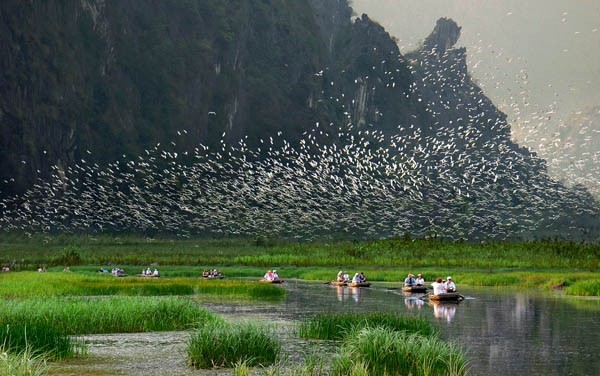Vietnam protects biodiversity for sustainable development
Thy Hat -
(VOVWORLD) - Biodiversity resources are the foundation for and the measurement of development of every nation around the world. Thy Hat has a story about biodiversity in Vietnam on the occasion of International Biodiversity Day, May 22.
 Van Long Nature Reserves Van Long Nature Reserves
|
Vietnam is internationally recognized as one of the world’s most bio-diverse countries, with many types of forests, wetlands, rivers, and coral reefs which create habitats for many birds, animals, and fish. Vietnam is ranked 16th in the world in biodiversity and one of the 10 richest biodiversity centers with many endemic flora and fauna species and rich genetic resources. Ms Hoang Thi Thanh Nhan, Deputy Head of the Department of Biodiversity Conservation of the Ministry of Natural Resources and Environment said biodiversity is the foundation of Vietnam’s tourism development. With the theme “Biodiversity- sustainable tourism”, International Biodiversity Day 2017 is designed to inspire the public to protect biodiversity and promote sustainable tourism growth: “In some localities, ecological tours have greatly benefited locals while helping to conserve biodiversity. The Van Long Nature Reserves in Ninh Binh province, the Marine Conservation Center in Cu Lao Cham in Quang Nam province, and Tram Chim National Park in Dong Thap province are role models in promoting ecological tours and conserving local biodiversity.”
Vietnam has issued a Law on Biodiversity in 2008, worked out a National Strategy on Biodiversity until 2020 and a Vision until 2030, and created a Master Plan on Biodiversity Conservation until 2020 and Orientation until 2030. Ms Nhan again: “To mark International Biodiversity Day, we will strengthen communications on biodiversity conservation and promote Vietnam’s biodiversity values. Protecting biodiversity is the task of all sectors at all levels and of the community.”
Vietnam is revising the Law on Biodiversity to better protect its natural resources and biodiversity.
Thy Hat